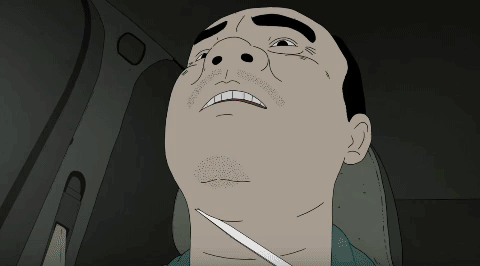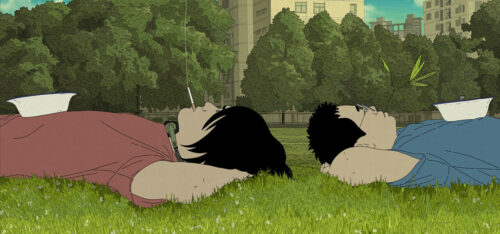‘Have a Nice Day,’ a Beijing Film Festival selection, is an unsparing portrait of urban China at the margins

The Beijing International Film Festival (BJIFF), which begins Sunday and ends on April 22, has never been particularly cutting edge. Co-founded in 2011 by the Beijing Municipal Government and the State Administration of Radio, Film and Television (still called SARFT back then), the festival has been criticized for forsaking innovative and exciting films in favor of safe crowd pleasers. In light of this, it was unusual to see one innovative, exciting, and decidedly unsafe film in this year’s lineup: Have a Nice Day (大世界 dà shìjiè), a darkly comic animated crime thriller written and directed by Liu Jian 刘健 that premiered at the prestigious Berlin Festival in February 2017 and picked up Taiwan’s Golden Horse Award for Best Animated Feature last November.
There’s only one problem: those hoping to catch the film will have the choice of trekking two hours to Huairou (this theater) for a Sunday screening (April 15, 6:30 pm), or one and a half hours to Fengtai (this theater) for a Saturday showing (April 21, 6:30 pm). Have a Nice Day seems like just the kind of movie the BJIFF might want to promote in order to distinguish the festival and develop a reputation for Chinese cinema, but artistic considerations, even those that might help project soft power, often fall to political ones. The film made headlines last summer when it was pulled from France’s Annecy International Film Festival last summer due to “official pressures.”
Which is all to say, if you’re able to attend either the April 15 or April 21 screening, go do it — it’s worth it. Tickets can be purchased via Taobao’s film app, Taopiaopiao 淘票票.
Perhaps the most telling moment in Have a Nice Day comes just as Mr. Skinny, a butcher who moonlights as a hitman, is about to murder Xiao Zhang, a construction site driver who has stolen a bag of cash from his boss. Skinny’s meat cleaver is poised when his phone rings and he pauses to politely field a call from an unknown number: “Property investment? No, I’m not interested. No, I don’t want to buy a house. Thank you.” With this line, director Liu reminds us of the force that has brought together Skinny, Xiao Zhang, and a motley cast of characters chasing the bag of money: China’s relentless urbanization drive. Set in a small town that is being slowly swallowed up by a big city, Have a Nice Day is a violent, bleak, and often hilarious take on the physical and moral toll of three decades of government-encouraged breakneck urbanization. Liu’s characters are members of China’s working-class (some might say “low-end”) population who have lost out in the urban transition yet haven’t quite abandoned the insane optimism that accompanies it. They still have dreams, but they also know it will take an illicitly gained bag of cash to achieve them.
Although technically an animated feature, Have a Nice Day might more accurately be called a motion comic (as some reviewers have suggested), for action in the foreground is minimal, sometimes limited to the smoke trailing from a character’s cigarette or a flickering streetlight. Liu has said this was a conscious choice, and indeed it serves to draw attention to his precisely drawn backgrounds which depict the agoraphobic landscape of the urban periphery in haunting detail.
As the money chase unfolds, the viewer becomes increasingly familiar with (and unsettled by) recurring backdrops: construction cranes towering above a decommissioned field; a half-completed apartment tower with a faux European facade; a grimy strip of shops, dark except for the Integrity Internet Cafe; a spanking new road, lit up like a stadium and entirely devoid of cars. An animation of a metro train speeding along the recognizable Yangtze River Bridge at night suggests that the city in question is Nanjing, one of the wealthiest in China, yet the residents of the “development zone” (as we learn it is called) are as far away socioeconomically from Nanjing’s gleaming downtown skyscrapers as they are from, say, America — a place that is referenced often with equal parts dreaminess and bitterness. The only economically successful person around seems to be Xiao Zhang’s boss, the gangster Uncle Liu, who is making a fortune in shady construction deals (Xiao Zhang is working on the site of the “East Mountain Villas — Giving You a Piece of England!”). In one memorable scene, he tortures a childhood friend while not considering the nature of art.
In the tradition of the bumbling hitmen-philosophers of Tarantino or Coen Brothers — who Liu has named as inspirations — our antiheroes’ dreams and inner psyches are revealed through deadpan monologues or absurd and often hilarious tangents. Yellow Eye, so called for his self-designed x-ray glasses, is the proprietor of a hole-in-the-wall restaurant who aspires to make good use of his gift for technological invention to start a business. “There’s no point in life if you don’t have ambitions,” he tells his accomplice/girlfriend, who refuses his renewed marriage proposal and makes off with the cash instead. Meanwhile, Xiao Zhang’s girlfriend’s sister, An An, enlists her boyfriend to help her steal the money so that they can run away to Shangri-La in Yunnan, giving way to a fantastical Cultural Revolution-style musical number that imagines the couple as apple-cheeked peasants toiling on a farm high in the mountains — though even in their fantasies, a pure glacial river is stopped up by a massive hydroelectric dam. Then there’s Mr. Skinny, who is doing double duty as a hitman in the hopes of sending his daughter abroad for university. On the way to murder Xiao Zhang, he takes a call from his wife, who went to see a fortune teller at the local temple and reports that their kid will definitely go to one of the Ivy League schools or Oxbridge. (Liu gets a ton of mileage out of satirizing the transactional approach to religion so prevalent in China’s development era; one of the most memorable exchanges of the film involves an earnest taxi driver who wants to know if God or Buddha is more powerful so he can choose which one to believe in.)
I don’t want to spoil the ending, but suffice it to say none of the participants in this madcap race for the renminbi meet a happy fate. As the characters were never more than flat archetypes, their demise is more funny than sad, and I get the sense Liu made it this way on purpose. Amid rapid urbanization, Liu suggests, it’s pointless to judge the moral character of a few grasping individuals. After all, we might conclude — viewing the final frame of rain pouring down on the low silhouette of the town, cranes looming in the background — what do the architects of macroeconomic development care for a handful of bodies and a bag of cash?








